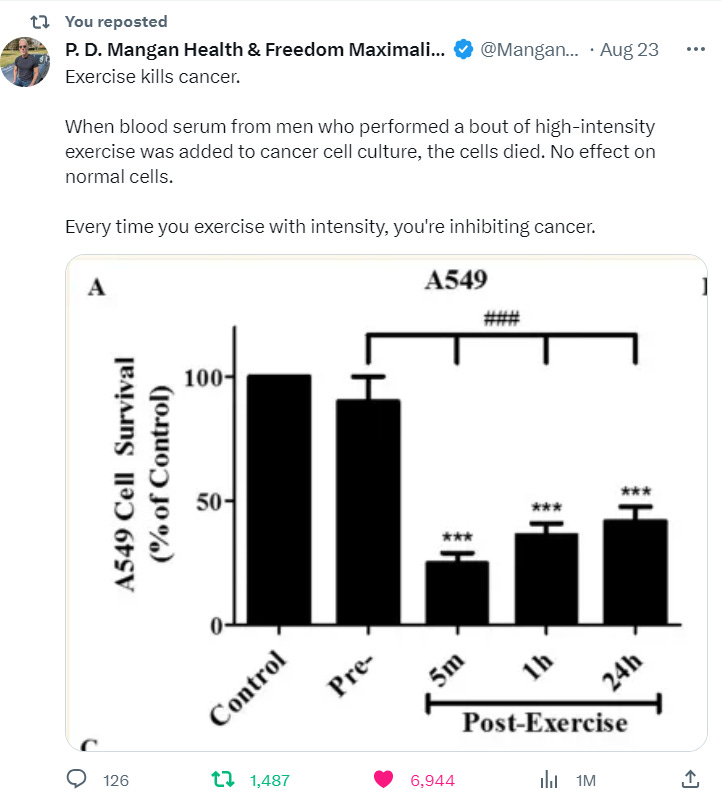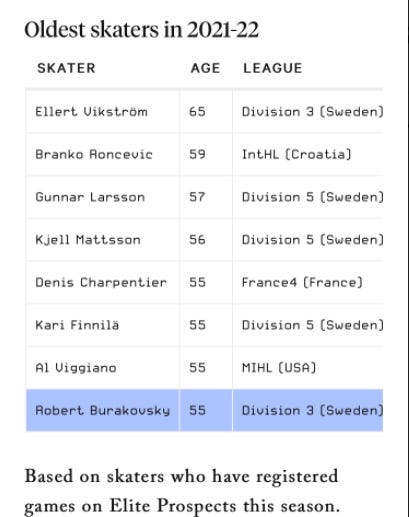Edition #219: Our Daily Choices Largely Determine How Our Future Health Will Unfold.
From youth sport to adulthood, athleticism can and should be a lifelong pursuit.
This past week I re-posted on social media a study about exercise killing cancer cells.
Ho hum.
Over 1 Million views so I guess someone saw it. Very interesting when you think of all the health advice we are receiving. Very little of this advice it is related to exercise and staying athletic.
One of my strongest passions in life is the commitment being active and staying athletic as we get older. These concepts are tied closely.
Staying athletic, being active, having fun and good health.
For these reasons, I thought I would refresh one of our more popular topics first presented in May of 2022 here in The Physical Movement. Staying athletic as we get older.
In short: what is stopping you from playing in that rec hockey game, or pickle ball or any other sporting activity that requires coordination, balance, endurance and power? (other than your body is not prepared and it requires effort).
The question for today is “should you be athletic beyond a certain age?”.
The answer is yes, but court of public opinion would have you think not.
Athleticism is the ability to repeatedly perform a range of movements with precision and confidence in a variety of environments, which require competent levels of motor skills, strength, power, speed, agility, balance, reaction time, coordination and endurance.
I searched far and wide, and no where did I find that these skills were limited by age. Yet, we think of athleticism being the attributes of a young person.
The correlation to declining health as we stop doing athletic things is real.
When we talk athleticism in our culture it is most often surrounding elite athletes. A competitive athletic career stops anywhere between 17 years old through to early twenties. College athletes compete beyond high school years and only a very small percentage of the population compete at the highest levels beyond that. However, the skills in being athletic don’t stop at all unless we stop practicing them.
The oldest registered pro hockey player is 65 years old and plays in a Division 3 league in Sweden. (reference eliteprospects.com)
Bill Lee, former major league pitcher, just pitched a scoreless half inning at 75 years old in Georgia last year.
Karla Del Grande, 67, recently won the world Masters Athlete of the decade (2010-2019). Her masters athletic career started at 49 years old and owns an incredible 17 Canadian indoor masters track records and 12 national outdoor records.
Maintaining the skill components of fitness may indeed be the fountain of youth.
While the health components of fitness (muscle strength, muscle endurance, body composition, flexibility and cardiovascular endurance) are the focus of a billion dollar industry, the skill components of fitness remain largely ignored.
Balance, coordination, reaction time, power, speed, agility ….these are the skills that define athleticism and they are not limited by age.
The change, as we get older, is that these skills decline quickly if ignored.
In fact, the new definition of athleticism as we get older may indeed be to be able to perform a wide range of movements with enough capacity to meet the demands of the movement, when wanted.
The “wanted” part is important, because we don’t “need to” much anymore. Just about everything can be done from the comfort of the couch. We don’t “need” to practice anything physical unless our job requires it.
That “want to” may be playing hockey, tennis, golf, slow pitch or dancing, skiing, riding a bike or hiking?
That “want to” may be playing with the kids/grandkids and overall meeting the demands of your favorite activity without compromise?
Or maybe the requirements of your physical work get less devastating as you get older if we stay athletic?
What stops us from improving in these skills as we get older?
Lack of practice and inactivity. Lack of interest or desire to build up the reserves to stay athletic. That comes down to mindset yes?
Being proficient in these athletic skills become pre-requisites for us to participate.
The kicker in all of this is that the development of these skills as we get older slows down the effects of aging.
How else can we explain the 75 year-old who is still pitching, the 65 year pro hockey player and the 67 year old track athlete?
It certainly can not only be genetics?
The same context of athleticism in older years applies as in the younger years. While genetics may control our ceiling, preparation and practice and a little luck control performance.
The very same concepts that we teach our youth athletes apply to us parents and coaches as we get older. We push the prioritization of training in skill development to the back of the bus for ourselves as we get older.
It becomes less of a priority, easier to stay on the couch and as we don’t use these skills, we indeed do lose them.
Important reasons to stay athletic as we get older:
· Role model. Coaches, parents staying athletic allows us to be the role models our youth need.
· Physical health. Say no more. Health is wealth. Don’t fall into the trap of thinking health is only about weight loss. Prioritize a regular routine that focuses on all the components of fitness, both health and skill.
· Social connection. The ability to connect through activity becomes a energy giving opportunity that fuels us later in life.
· Independence. Being able to do what we want, where we want with whom we want is easier when strong in the skill components of fitness.
How do we maintain our athleticism as we get older?
Treat physical activity as athletes do. A regular process practicing various skills of fitness.
Coach Dan John brought forward a concept, in his book Intervention, of bus stop workouts vs park bench workouts.
The bus stop workouts follow a preset schedule and if the bus is not on time, or we are not on time, stress mounts. Scheduled and rigid, the bus bench approach is what we see in most of our society. Bus bench fills us with expectation. While some of this has its place, it should not be the guiding principle to regular activity. Park bench approach is more casual and goes with the flow.
Fitness and exercise in our culture is presented as beautiful bodies, restriction and sacrifice, big time commitment, push beyond limits. Although mostly portrayal of younger people (under 30), even the older fitness devotees are presented as fitness models with less than 5% body fat, with heavy tan, thick hair, and bulging muscles (male or female).
I suppose there is nothing wrong with any of the above, with 1 exception: it is not sustainable for the rest of us.
The bus bench approach puts rigid goals and targets. “ I need to lose 20lbs asap”. “I need to fit into this dress size by such and such a date”. For athletes, an example is that “we need to win today or I will score so much today”. Outcome focused.
The level of sacrifice, time commitment, restricted diets etc are all not realistic for most people. Kind of like driving in the fast lane on the highway all the time.
This approach rarely (if ever) works out in the end.
Instead, for most of us, the park bench approach is most appropriate, whether you are still competing or not.
As Coach John states “When you compete or train, take time to enjoy the view, breathe the air, and don’t worry about the minutia! Whatever comes along during your competition or training should be viewed through the lens of wonder and thanks.”
Fitness and building athletic skills don’t have to be ball busters all the time. And, not coincidentally, taking the park bench approach is often what yields better, long-lasting results. The fast lane mindset of the bus bench approach is wearing us down. To think at the end of the long day that we need to follow that rigid schedule regardless of how we feel is stacking the cards against us.
Park bench, watching the birds, enjoying the day, doing something without the burden of obligation seems like a more reasonable route.
When we practice the skills of balance, speed, reaction time, power, coordination and agility within this context then staying athletic seems much more reasonable.
Both of the women below are 80 years old. Don’t fool yourself, it is our daily choices that largely determine how our future will unfold.








